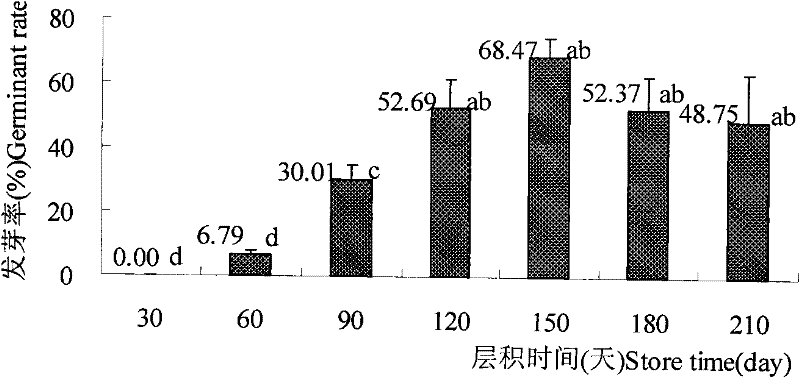Method for breaking Thesium chinense seed dormancy for promoting germination
A technology of thymegrass and seeds, applied in the fields of seed and rhizome treatment, application, agriculture, etc., can solve the problems of germination starting from March to April of the following year, low germination rate, low emergence rate, and inability to meet the needs of medication, etc., to achieve Shorten the dormant period, improve the uniformity, and promote the effect of germination
- Summary
- Abstract
- Description
- Claims
- Application Information
AI Technical Summary
Problems solved by technology
Method used
Image
Examples
specific Embodiment 1
[0027] A. Seed collection: naturally air-dry the collected (collection location?) thyme grass seeds, remove impurities and empty seeds, and select mature and plump seeds for later use;
[0028] B. Seed pretreatment: Rinse thyme grass seeds with running water for 24 hours, then use 500mgL -1 GA 3 Soak seeds in aqueous solution for 24 hours, remove and dry the moisture on the surface of seeds;
[0029] C. Low-temperature sand storage stratification: choose river sand with uniform particles, wash, dry, and naturally cool to room temperature after drying in an oven at 110°C for 4 hours. The ratio of 3 is mixed evenly, and the water content of the matrix is preferably "hand-holding into a ball, loosening up", and placed in a refrigerator at 1-5°C for stratification treatment for 150 days;
[0030] D. Seed Germination: After the stratification treatment, the seeds were cultured under dark conditions at 20° C., and the germination rate of the seeds could reach 68%.
PUM
 Login to View More
Login to View More Abstract
Description
Claims
Application Information
 Login to View More
Login to View More - R&D
- Intellectual Property
- Life Sciences
- Materials
- Tech Scout
- Unparalleled Data Quality
- Higher Quality Content
- 60% Fewer Hallucinations
Browse by: Latest US Patents, China's latest patents, Technical Efficacy Thesaurus, Application Domain, Technology Topic, Popular Technical Reports.
© 2025 PatSnap. All rights reserved.Legal|Privacy policy|Modern Slavery Act Transparency Statement|Sitemap|About US| Contact US: help@patsnap.com



